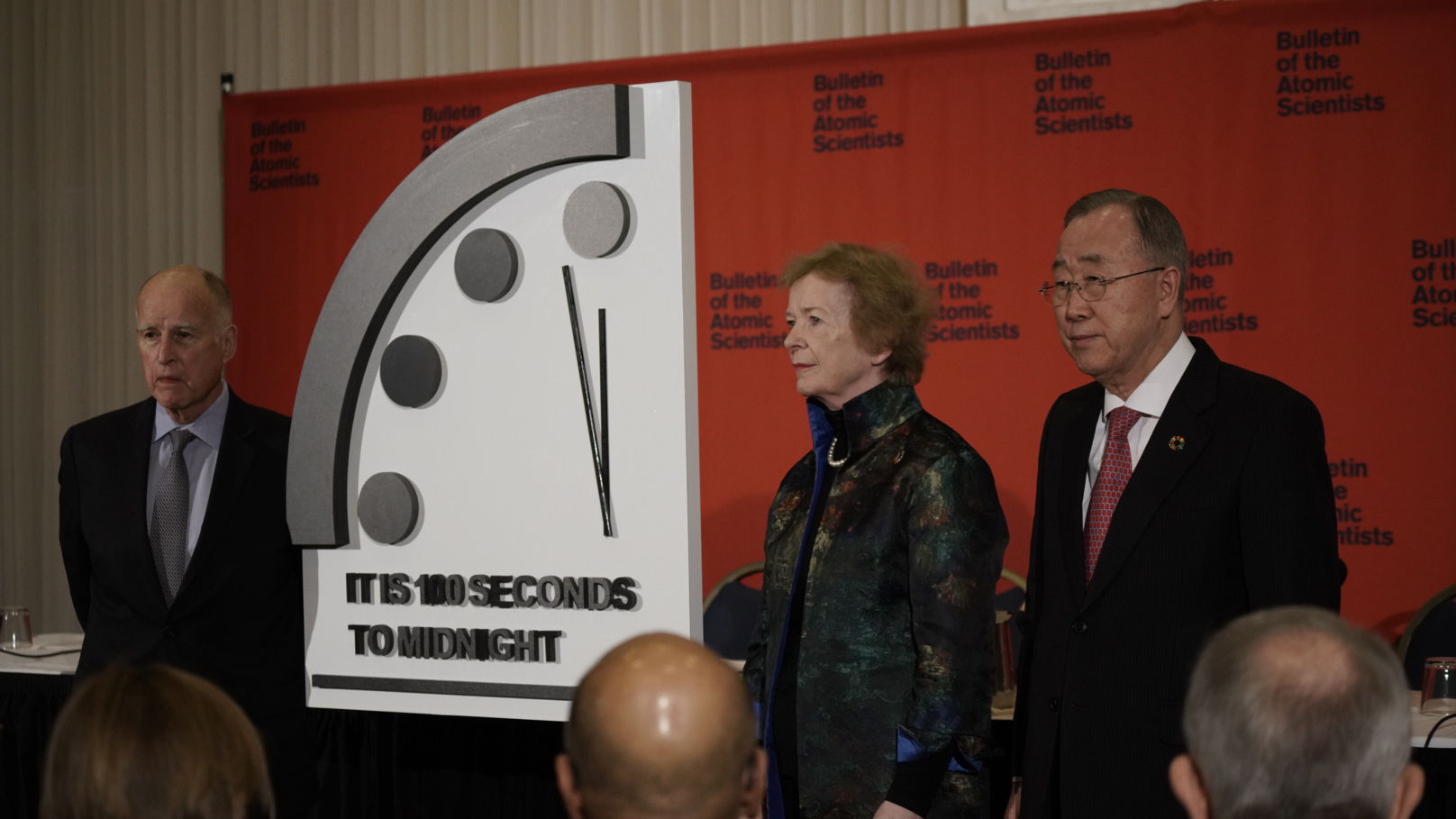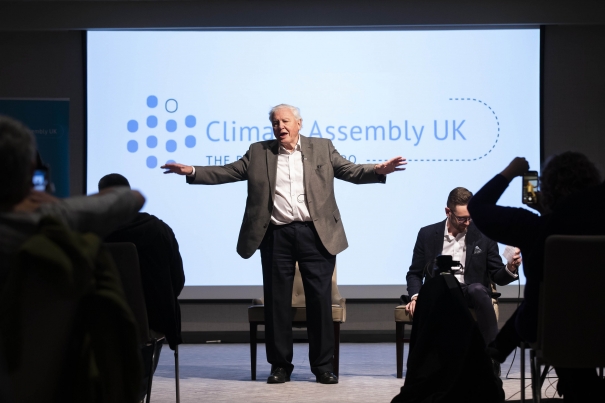Talking Points: January 2020
Posted on 05 Feb 2020 Categories: Blog, Climate crisis, Local initiatives, Talking Points, The business we want
by Rethinking Poverty
On 23 January, the Bulletin of Atomic Scientists announced that the ‘Doomsday Clock’ has moved 20 seconds closer to midnight – the closest it has come to signalling a global meltdown and catastrophe. The metaphorical clock, used to gauge threats of nuclear war and climate change, is now set at 100 seconds before midnight. In view of this, it’s not surprising that January’s Talking Points features initiatives by companies and local authorities to address the climate crisis.

Rethinking the role of business in society
It looks likely that it is the climate crisis more than anything else that will push business to rethink their role in society. Pressure is coming from pension and investment funds and from employees. A group of 11 pension and investment funds managing more than £130 billion worth of assets have filed a resolution calling on Barclays to stop lending to fossil fuel firms.
Meanwhile hundreds of Amazon workers are defying corporate policy to publicly criticize the company for failing to meet its ‘moral responsibility’ in the climate crisis. Employees at Amazon have increasingly criticized the company in recent years for its contracts with large oil and gas firms. In spring 2019, more than 8,700 employees signed an open letter to the CEO, Jeff Bezos, urging him to take bolder action on climate change.
Sainsbury’s has pledged to spend £1 billion to become carbon-neutral by 2040, while the Guardian has announced it will no longer accept advertising from oil and gas companies. The number of flights taken for business travel is another area in the spotlight. ‘We’re starting to get inquiries from the business travel-buying community (corporate travel buyers) to discuss what they should be doing about the impact of climate change on travel,’ says Cait Hewitt, deputy director of campaigning organisation Aviation Environment Federation.
Local approaches to tackling the climate emergency
In the UK and continental Europe, cities are setting out their plans to reduce their carbon emissions. In the UK, Nottingham has announced its aim to be the UK’s first carbon-neutral city by 2028. The Independent quotes Jonathan Ward, principal energy policy officer: ‘The key thing is to embed this into everything the council does so that potential environmental impact feeds into the decisions we make across every department. This is why there is no separate budget for all this stuff.’ According to Manchester mayor Andy Burnham, Manchester’s cycle network plan could be a national blueprint.
In the Netherlands, Rotterdam is striving to become a circular economy by 2050. In an abandoned Centre Parcs, entrepreneurs are making innovative products out of rubbish. Amsterdam has similar goals. On 15 January, Barcelona City Hall officially declared a climate emergency, announcing its plans to invest €563 million in a sweeping range of measures to halve greenhouse gas emissions by 2030. The climate emergency package outlines 103 different actions, including expanding the areas of the city restricted to traffic and creating new parks.

The importance of the local
The work of keeping the Green New Deal alive begins in communities, says Adrienne Buller, writing for Jacobin magazine. ‘It involves conducting demonstrations of GND-type policies and their tangible benefits; already, organizations like the Centre for Local Economic Strategies – the engine behind the “Preston Model” of local community wealth building – are leaders in this work. This effort also involves building from both the successes and the failures of municipally owned energy companies like Nottingham’s Robin Hood and Edinburgh’s Our Power.’
Hull is a city that wants to take on the role of showcasing new public policy approaches, asking to be first UK city to trial universal basic income for its residents after a cross-party group of councillors formally backed the idea. The proposal would mean every adult would be paid a basic sum – potentially between £50 and £100 a week – regardless of income.
Tackling inequality
Inequality remains a blight on the UK, as well illustrated by the shocking story of a homeless woman lying down in the cold and giving birth to twins on the morning before Christmas Eve near to Trinity College, Cambridge, the university’s richest college in the UK’s most unequal city. The gap between young and old has turned Britain into a dysfunctional family, writes John Harris in the Guardian. Being wealthy adds nine years to healthy life expectancy – a life free from disability and pain – according to newly published transatlantic research. The poorest third of the UK’s older working-age adults today have worse health than people born a century ago had at the same age, according to a new study from University College London. The average low-income family in the UK’s most deprived areas – including ‘left behind’ communities in the north of England – is likely to be worse off under universal credit, according to a study by the Resolution Foundation.
How can the UK’s damaging level of inequality and poverty be tackled? The IMF’s managing director, Kristalina Georgieva, says higher marginal tax rates for the better off are needed as part of a policy rethink to tackle inequality. But if you’re focusing on inequality between regions of the UK, ‘a massive power shift from London to local areas’ would be ‘the fastest route to “levelling up”’. Ministers need to give local government the decision-making and tax-raising powers it needs to make a difference. ‘Breaking the grip of the centre and empowering communities to solve their problems – that really would be very clever,’ says public policy analyst Richard Vize.
A new sort of democracy

The weekend of 25-26 January saw 110 people gathering in Birmingham for the start of the UK’s first climate assembly. They were selected by a computer to be representative of society, including a mix of ages, genders, ethnic backgrounds and education levels, and also a range of views about the climate crisis.
This was the first of four weekends when they will discuss a range of issues with experts and decide on a set of recommendations for how the government can reach its target of net-zero emissions by 2050. The results from the assembly will be made public in April, and a House of Commons debate will follow. The recommendations will not be legally binding, but, as Caroline Lucas pointed out, ‘for a government that has said it wants to [make the UK] the greenest country in the world, it would be quite difficult for them to completely sideline these views.’
Want to keep up-to-date with more articles like this? Sign up to our newsletter.
Posted on 05 Feb 2020 Categories: Blog, Climate crisis, Local initiatives, Talking Points, The business we want
